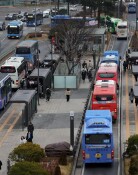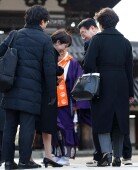Realities of unfair trade by public corporations
Realities of unfair trade by public corporations
Posted February. 26, 2001 14:33,
The Fair Trade Commission`s (FTC) decision to recommend the indictment of two public corporations on charges of engaging in unfair transactions, the first case of its kind in the nation, reflects the government`s will to finalize reforms in the public sector by the end of February.
In the past, many analysts pointed out that public sector restructuring lagged far behind that in the financial, corporate and labor sectors. President Kim also instructed the FTC late last month to more thoroughly oversee the activities of public corporations.
There were also indications that the FTC had dealt a severe blow to private enterprises, but remained lenient when it came to public sector firms.
Support for affiliates:
Despite past disciplinary steps against public corporations for unfair transactions with their affiliates, such practices are still apparently rampant.
Korea Highway Corp. (KHC), Korea National Housing Corp. (KNHC), Korea Land Corp. (KLC), and Korea Water Resources Corp. (KWRC) dispatched 13.8 billion won in orders for administrative services to the Korea Construction Management Corp., in which they invested through a private contract last year. By signing the contract at a price that was 7.9-20.8% higher than the bidding price would have been in open competition, they extended 1.378 billion won in unfair support to their affiliate.
KNHC and KHC, which were found in May 1999 to be supporting their affiliates through high-priced private contracts, were recently discovered to have maintained this illicit practice.
KNHC granted special favors to its affiliate, ``New Housing,`` by paying 405 million won in personal expenses to heads of the firm and accepting rental fees and guarantee money after the scheduled deadlines. KNHC extended 467 million won in support to New Housing, including exempting 62 million in delayed interest.
KHC slashed the rental charge for 14 rest areas it rented to its affiliate, Korea Highway Management Corp. (KHMC), by 1.465 billion won. The apparent reason was that KHMC recorded deficits from August 1998 to December 2000.
Passing expenses on to private subcontractors:
Public corporations made unreasonable demands on their private trading partners on the strength of their monopolistic or dominant market positions. They employed various means, including passing on expenses to subcontractors or refusing to pay indirect expenses such as material storage fees.
KHC failed to repay 469 million won in due interest to its 20 trading partners between February 1998 and October 2000.
KNHC passed expenses amounting to 32 million won to its subcontractor in the course of completing apartment electricity work in Namyangju City, Kyonggi Province.
In the course of leasing rest areas and shops at 17 dams to private companies since 1996, KWRC concluded a leasing contract with private firms on condition that the sales price be determined by KWRC.
After signing a contract to purchase 1.16 billion won worth of goods from an insulation supplier in February 1998, Korea District Heating Corp. (KDHC) cancelled its purchase of 176 million won worth of goods when the delivery date was imminent and did not pay due storage fees.
Public corporations raise objections to FTC decision:
KNHC objected to the FTC decision, saying in a statement, ``Its contentions with respect to the construction management corporation and New Housing run counter to the facts. For this reason, we will seek countermeasures, including an objective application.``
KHC also said, ``We excluded the rental charge in the judgment that the possible shutdown of deficit-ridden rest areas would cause serious inconvenience to customers.``
Choi Young-Hae moneychoi@donga.com







